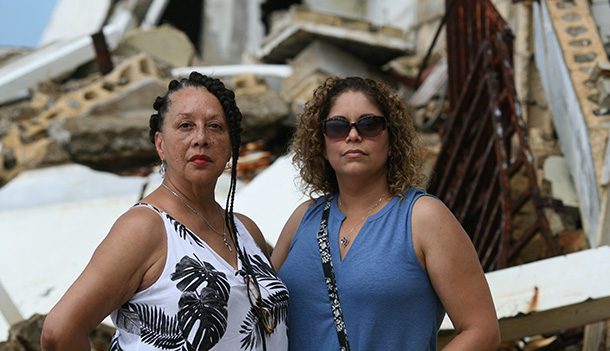Drs. Audeliz Matias and Sheila Marie Aird Begin Collecting Oral Histories of Hurricane Maria in Puerto Rico

Over the summer, Drs. Audeliz (Audi) Matias (Associate Professor and Mentor, Department of Natural Sciences) and Sheila Marie Aird (Associate Professor and Director of European Academic Programs), began the first phase of their oral history project in Puerto Rico, which is funded by the 2018 Oral History Association Emerging Crisis Oral History Research Grant. The project is titled, “An Oral History of Hurricane Irma and Maria: A Social, Cultural, and Environmental Crisis in Puerto Rico and the U.S.V.I.” and has been designed to collect first-hand narratives two years after the 2017 hurricanes devastated the islands.
The first phase of the field research interviews included locals, geologists, chancellors from a private higher education institution, a biologist and others that survived the natural disaster. As it has always been the underlying premise to have a wide cross-section of voices included in the collection, Matias and Aird wanted to include as many individuals as possible from different backgrounds and locations to demonstrate the human experience. As they collected the stories, Matias and Aird (pictured in front of a house demolished by Hurricane Maria in the coastal town of Rincon) discovered how important it was for people to share their experiences as well as offer additional connections. Provost Meg Benke kindly assisted the team, connecting with some of those interviewed.
Oral histories serve as a reminder of the connection between science and society
The interviews took place on the western side of the island which was severely affected by the storm surge, flooding, and land failure during and after Maria. “To say this was a humbling experience does not capture how open and responsive people were in talking with us and sharing their experiences. Oftentimes, the people who have lived in a community are keenly aware of important details that help to understand not only the actual act but possibly the precursor to the event as well,” said Aird. Matias added, “Listening to the stories from September 20, 2017 was not easy, and the citizens’ voices will always have a special meaning to me. As a Puerto Rican, it is very hard to see that many of the damaged properties were abandoned and will never be rebuilt. On the other hand, as a geologist, documenting the environmental changes caused by Maria through oral histories serve as a reminder of the connection between science and society.”
This work is important from several perspectives. “We want to not only collect data on the social and cultural impact, but additionally posit the environmental consequences that are important to understanding these particular crises long-term. As a result, it was important from the onset to allow the persons interviewed to speak their truth, discuss how and when they were impacted and to explain the event on their terms,” said Aird. “It was also very important for us to understand the environmental impact not only from a scientific perspective but also as a window through which to view both the pre- and post-aftermath,” added Matias.
Both Matias and Aird have family roots in the Caribbean, with Aird’s family coming from Grenada. As a result, the research is not only academic but also influenced by their personal connection. The next phase will include interviews conducted in the USVI. Drs. Matias and Aird intend to create a space to share the interviews, and will keep the community posted.
Related Articles
UNYP Chronicle Newsletter
The e-mail address you provide will be used only to send you the newsletter. Your privacy is important to us.
For more information download our UNYP Brochure.

Contacts
University of New York in Prague
Londýnská 41, 120 00 Praha
ID no: 25676598
Phone:
+420 224 221 261
![]() Skype
Skype
Email: unyp@unyp.cz







